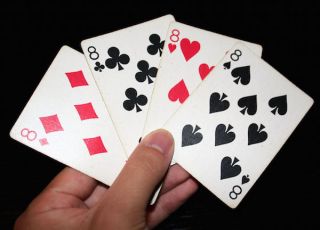
Play
A Game of Cards: A Gateway to Social Literacy
It's called "Crazy Eights," but it's not as crazy as you might think.
Posted August 27, 2015

Crazy Eights is one of those card games that almost begs you to come up with new rules. It’s so simple to play that a five-year-old can learn it in a few minutes. And its principle so elegant (match either color or number, be the first to get rid of all your cards), that it can support a near infinite amount of rule additions and changes. (The Card Games Website has an excellent page on Crazy Eights and its variations.)
This makes it a perfect tool for nurturing the development of a play community. Since it’s so easy to invent and explore new rules, the game can be made to match almost any mood or combination of skill levels the players wish to explore. Since it’s a quiet, table game, it is especially powerful as a tool for bringing the healing power of fun to the whole community.
Crazy Eights is the kind of game where sooner or later somebody does something not very nice, or not very helpful, to someone else. Sometimes the thing they do could even be interpreted as “mean” – except for several very important things:
One: Crazy Eights is just a game. Whether you win or lose has really nothing to do with how good or loved or valued you are as a person.
Two: sometimes when you do that “mean” thing, you don’t really mean to be mean, if you know what I mean. You have no choice. The only card you can play is a red eight, and the rule is that the player who ges the red eight has to pick up eight cards. So when you play it, the player next to you isn’t going to be happy. Even though it’s your sacred parent or cherished spouse or valued sibling or delightful child who falls victim to your unavoidable discard, what else can you do? It’s not your intention or your fault. You have to play.
And finally, the fact is, and everybody knows it, no matter how strategic you try to be, how cunning or caring or kind, winning or losing are really more a result of luck than skill. That’s why Crazy Eights becomes such a perfect community game. It’s fun. It’s easy to learn. But especially because it gives people a chance to play with behaviors which, under normal circumstances, would be considered “not nice.”
So, as long as Crazy Eights is fun for everyone, then those aspects of the game that we might consider to become negative, actually become a source of healing – of extending the repertoire of behaviors and emotions that can be safely expressed. There are many things that people can do in a game of Crazy Eights to try outdo or undo each other. When you use a wild card, you have the opportunity to change to a color that the next player might not have, and consequently force that player to draw another card. And, as other people get close to winning, these opportunities become necessities.
One of the most remarkable assets of Crazy Eights is not the rules, but how many ways there are to change them. There are so many things you can do to make the game meaner or sillier, faster or funnier, easier or gentler. Black fours, for example, mean that the first person to say "porcupine" gives any two cards to anyone else. As the community becomes more proficient in changing rules and devising new rules, the community members also develop what might be called a kind of “Social Literacy.” Understanding how a new rule could affect the game and the relationships and the experience of each player is a very complex and sophisticated social skill. It is a skill that is essential to leadership, effective parenting, facilitation, teaching, to developing and maintaining healthy relationships, to personal and social empowerment.
And because Crazy Eights is such a flexible game, so easy to change and explore, it becomes an opportunity to learn together. An opportunity to grow together. All for the sake of play. All in the name of fun.

